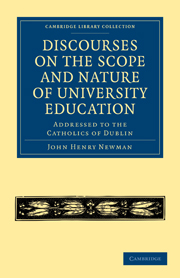Book contents
- Frontmatter
- PREFACE
- Contents
- CORRIGENDA
- Discourse I Introduction
- Discourse II Theology a Branch of Knowledge
- Discourse III Bearing of Theology on other Branches of Knowledge
- Discourse IV Bearing of other Branches of Knowledge on Theology
- Discourse V General Knowledge viewed as One Philosophy
- Discourse VI Philosophical Knowledge its own end
- Discourse VII Philosophical Knowledge viewed in relation to Mental Acquirements
- Discourse VIII Philosophical Knowledge viewed in relation to Professional
- Discourse IX Philosophical Knowledge viewed in relation to Religion
- Discourse X Duties of the Church towards Philosophy
- Appendix
Discourse VIII - Philosophical Knowledge viewed in relation to Professional
Published online by Cambridge University Press: 05 July 2011
- Frontmatter
- PREFACE
- Contents
- CORRIGENDA
- Discourse I Introduction
- Discourse II Theology a Branch of Knowledge
- Discourse III Bearing of Theology on other Branches of Knowledge
- Discourse IV Bearing of other Branches of Knowledge on Theology
- Discourse V General Knowledge viewed as One Philosophy
- Discourse VI Philosophical Knowledge its own end
- Discourse VII Philosophical Knowledge viewed in relation to Mental Acquirements
- Discourse VIII Philosophical Knowledge viewed in relation to Professional
- Discourse IX Philosophical Knowledge viewed in relation to Religion
- Discourse X Duties of the Church towards Philosophy
- Appendix
Summary
I have been insisting, in my two preceding Discourses, first, on the cultivation of the intellect as an end which may reasonably be pursued for its own sake; and next, on the nature of that cultivation, or what that cultivation consists in. Truth of whatever kind is the proper object of the intellect; its cultivation then lies in fitting it to apprehend and contemplate truth. Now the intellect in its present state, with exceptions which need not here be specified, does not discern truth intuitively, or as a whole. We know, not by a direct and simple vision, not at a glance, but, as it were, by piecemeal and accumulation, by a mental process, by going round an object, by the comparison, the combination, the mutual correction, the continual adaptation, of many partial notions, by the joint application and concentration upon it of many faculties and exercises of mind. Such a union and concert of the intellectual powers, such an enlargement and developement, such a comprehensiveness, is necessarily a matter of training. And again, such a training is a matter of rule; it is not mere application, however exemplary, which introduces the mind to truth, nor the reading many books, nor the getting up many subjects, nor the witnessing many experiments, nor the attending many lectures.
- Type
- Chapter
- Information
- Discourses on the Scope and Nature of University EducationAddressed to the Catholics of Dublin, pp. 241 - 288Publisher: Cambridge University PressPrint publication year: 2010First published in: 1852



